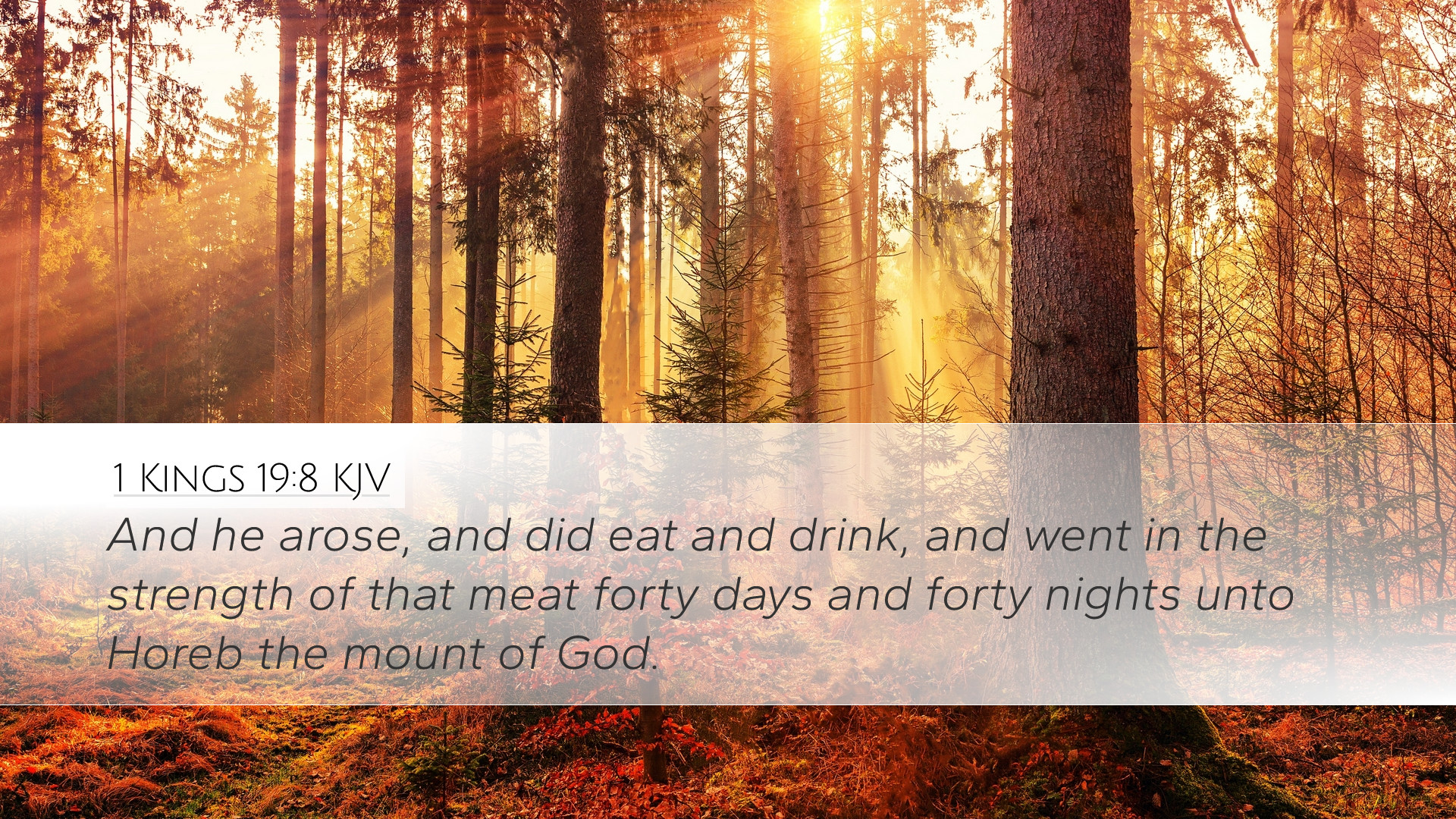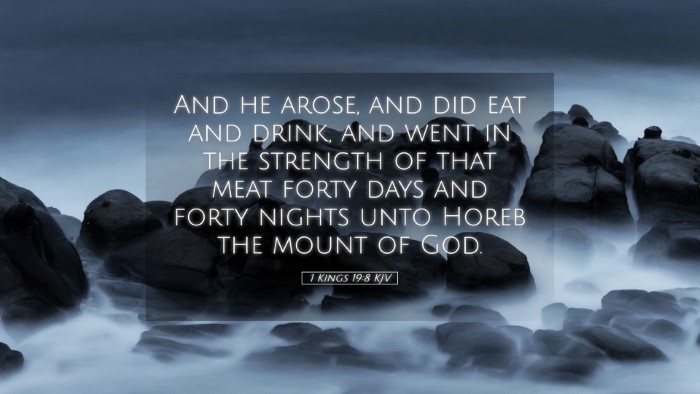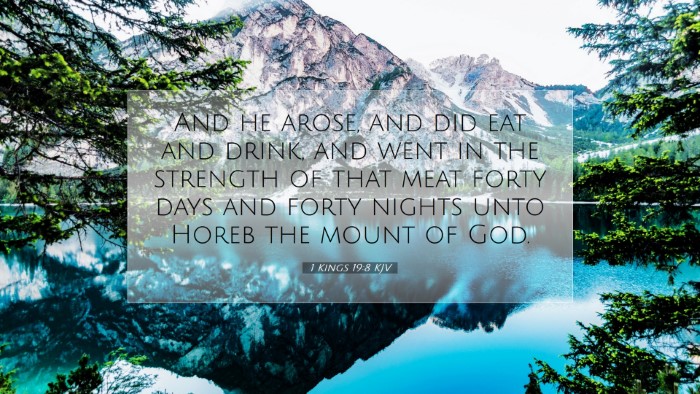Old Testament
Genesis Exodus Leviticus Numbers Deuteronomy Joshua Judges Ruth 1 Samuel 2 Samuel 1 Kings 2 Kings 1 Chronicles 2 Chronicles Ezra Nehemiah Esther Job Psalms Proverbs Ecclesiastes Song of Solomon Isaiah Jeremiah Lamentations Ezekiel Daniel Hosea Joel Amos Obadiah Jonah Micah Nahum Habakkuk Zephaniah Haggai Zechariah Malachi1 Kings 19:8
1 Kings 19:8 KJV
And he arose, and did eat and drink, and went in the strength of that meat forty days and forty nights unto Horeb the mount of God.
1 Kings 19:8 Bible Commentary
Commentary on 1 Kings 19:8
Verse Text: "So he arose, and did eat and drink, and went in the strength of that meat forty days and forty nights unto Horeb the mount of God." (1 Kings 19:8, KJV)
Introduction
The context surrounding 1 Kings 19:8 is crucial for understanding its theological and practical significance. This verse follows Elijah’s flight from Jezebel and his feelings of despair and abandonment. Within this narrative, significant themes emerge including God’s provision, human weakness, and the importance of spiritual renewal.
The Necessity of Rest and Nourishment
Elijah's journey is marked by exhaustion and fear; thus, God’s provision of food and drink reflects His understanding of human needs.
- Matthew Henry highlights the divine care in renewing Elijah's strength, which points to God's mercy during times of distress.
- Albert Barnes emphasizes the importance of physical sustenance in spiritual endeavors, illustrating how God nurtures both body and spirit.
- Adam Clarke notes the significance of the meal as a divine intervention that prepares Elijah for the challenges ahead, indicating that physical vitality is essential for spiritual missions.
The Journey to Horeb
This verse indicates that Elijah traveled “forty days and forty nights” to Horeb, also known as Sinai, which is rich in biblical symbolism.
- Matthew Henry discusses the typology of forty days, suggesting a significance akin to the Israelites’ journey, paralleling their struggles and encounters with God.
- Albert Barnes examines the choice of Horeb, linking it back to Moses and the covenant, suggesting that Elijah was not just fleeing but seeking communion with God.
- Adam Clarke reflects on Horeb as a place of revelation and restoration, noting that Elijah's journey represents a quest for clarity and a deeper understanding of his mission.
The Role of Divine Sustenance
Elijah’s experience underscores the idea that our spiritual lives are contingent on regular, divine sustenance.
- Matthew Henry states that physical food can be a means through which God imparts spiritual strength, illustrating the fusion of the physical and the spiritual in God’s economy.
- Albert Barnes observes that God provides not just for immediate needs but also for the strength necessary to fulfill a longer divine mission, exemplifying divine foresight.
- Adam Clarke points out the importance of relying on God's provision as a powerful lesson for believers today — that we must seek spiritual nourishment through prayer, Scripture, and community.
Emotional and Spiritual Restoration
The verse highlights the restoration of Elijah at a critical juncture in his despair. After a period of intense anguish, the sustenance provided is pivotal for his emotional and spiritual revival.
- Matthew Henry observes how God’s mercy in providing food helps replace despair with renewed hope and courage to face future trials.
- Albert Barnes expounds that spiritual journeys often require emotional and psychological healing, and that God meets us in our brokenness.
- Adam Clarke emphasizes the necessity of self-care in ministry, portraying that even the mightiest prophets need moments of restoration and retreat.
Theological Implications
The theological implications of 1 Kings 19:8 extend beyond the narrative of Elijah’s physical journey to Horeb. It invites deep reflection on the character of God and His interaction with humanity.
- Matthew Henry articulates that God’s provision is emblematic of His covenant love, urging believers to trust in His continuous care.
- Albert Barnes reflects on the sovereignty of God in orchestrating events in the life of His servants, suggesting that the journey to Horeb is predestined for a purpose.
- Adam Clarke emphasizes the relational aspect of God’s engagement with Elijah, illustrating that God is attentive to His servants’ needs and challenges.
Conclusion
In summary, 1 Kings 19:8 provides a profound insight into God’s faithfulness and provision. It showcases how God cares for us not only spiritually but also physically. For pastors, students, theologians, and scholars, this verse serves as a reminder of the importance of self-care, rest in ministry, and the ways God uniquely intersects our narratives. As we navigate our own journeys, we are encouraged to seek God’s sustenance and to remember that He invites us into places of renewal, just as He led Elijah to Horeb.


